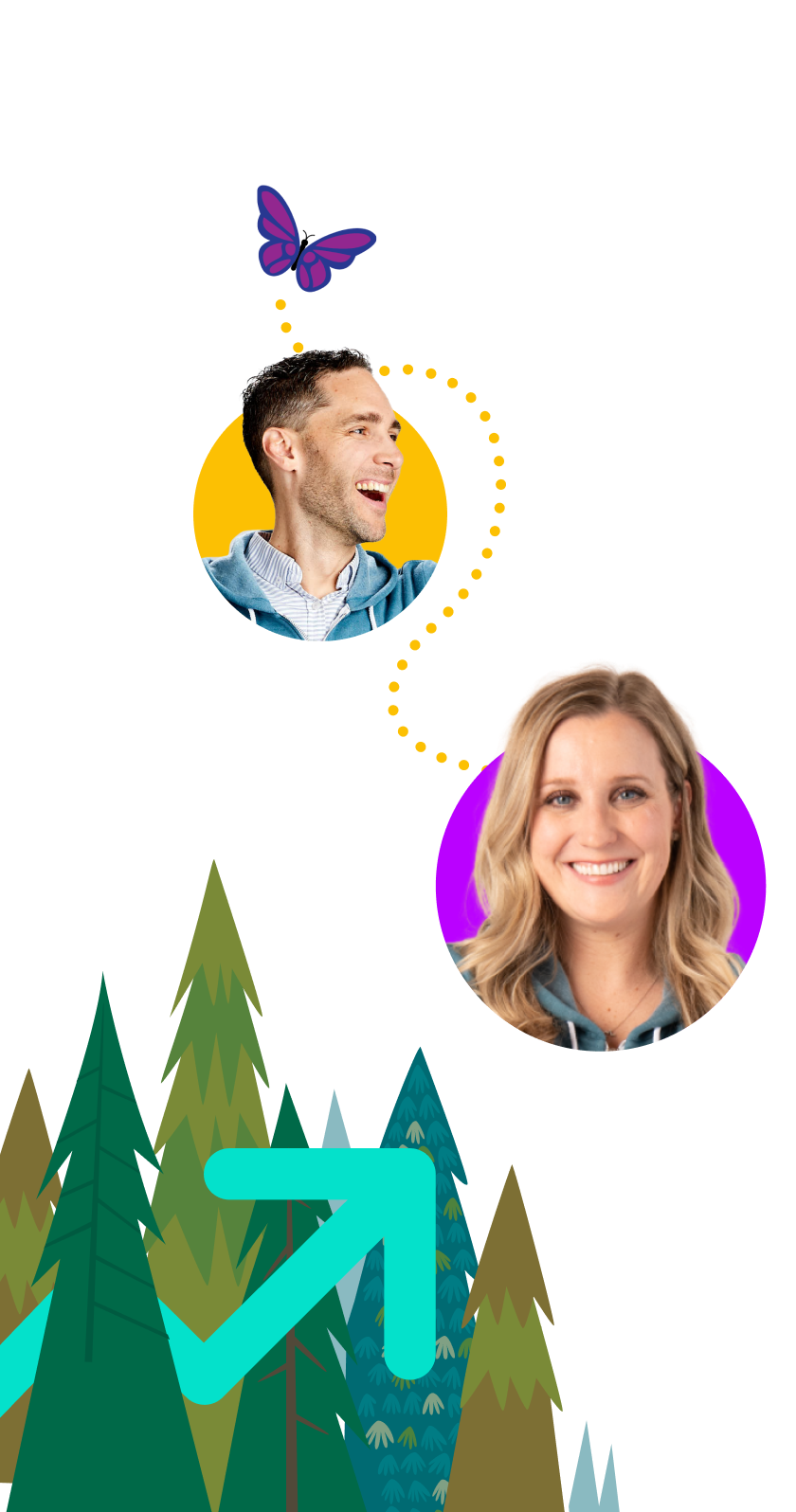It’s cold and lonely.
You’re a month into the quarter, and your pipeline is near empty.
Maybe it’s the leads. Maybe it’s the offer.
Maybe it’s you.
You want a little advice, but you don’t want your supervisor to think you’re incompetent. And you definitely don’t want the other reps thinking you’re desperate. You need to go to a safe place to ask for guidance and the honest feedback that only comes from collaborating with other sales professionals who also truly know their stuff.
That’s where your sales community comes in. Discover how sales communities can benefit you, why you should join and which ones you should look into.
What you’ll learn
Join the Salesblazer movement
We’re building the largest and most successful community of sales professionals, so you can learn, connect, and grow.
What are sales communities?
A sales community is any group of sales professionals gathered in one place, be it physical or virtual. It could be a weekly mastermind hosted at a co-working space where members swap leads and tips. It could be an annual conference where old friends reconnect and learn the latest trends from top-level sales executives. It could even be a subreddit, Discord server, or Slack channel where members commiserate and collaborate. It can be any or all of these things — and it might just be your secret weapon to becoming a top-performing salesperson.
After a busy day of calls, emails and deals, it’s not uncommon to think your time should be spent where leads are rather than with your competition. But mentorship can be an essential part of growth. Consider these five benefits of joining a sales community:
1. Tap into the collective expertise of top salespeople
At their best, a sales community can be a braintrust of people you normally wouldn’t interact with since they’re not your immediate colleagues. Every person has different structures, targets, products, geographic areas and experiences to learn from. Whether they’re your direct competitors or not, you can probably learn something from them.
2. Attend exclusive events
Sales communities come in different levels of exclusivity, too. There might be online and in-person events that are only accessible to members, which gives you more opportunities to share and learn than you’d otherwise get. Events you might get access to include weekly meetups, retreats, or even annual expositions.
3. Network with other professionals
Keep in touch with distant work acquaintances outside of the convention and conference circuit. Everybody brings with them their network of suppliers you might be able to connect with, partners who could enhance your offerings, talent you might be interested in hiring, and recruiters if you need to get a new job. There are always diverse opportunities when it comes to new people.
4. Access tools and resources you might not have heard of
Some sales communities revolve around specific products, which you can learn a lot more about by being in the mix. The community might have a collaboratively built collection of blog posts, a winning sales playbook, or the inside scoop on an innovative sales engagement platform.
5. Upskill with insights from executive-level members
Executive-level members congregate in sales communities to take the temperature of the profession, seek out insights, and test their theories. After all, they’re expected to provide thought leadership within their organizations, and those thoughts don’t appear from nowhere. Where you might find your own organization’s executives to be difficult to book time with, it may be easier to pick the brains of the executives you share a community with, especially since they might be more open to offering insight.
Not all communities bring value. Some are spammy, and some are ghost towns. Use these techniques to figure out if one is right for you:
What is their reason for existing? Sales communities can be based around:
- An influencer: A strong personality who posts a lot can draw a group together. The good ones share their knowledge while hanging onto paid offerings like coaching and masterminds, which can be helpful. The bad ones stay distant and only seek validation of their content, locking everything behind paywalls.
- A product: Popular sales tools like CRMs and enablement platforms often bring users to one place. Good communities encourage open discussion while making everyone better at using the tools. The bad ones either have very few posts or only allow discussions of features and roadmaps.
- A sub-group: This could be an industry, like aerospace or insurance, a demographic, like women or minorities, or a role, like sales development reps (SDR) or account managers. The fit really determines whether it has value to you.
The easiest way to do this would be to make a free account and lurk for a week or so. Read what people say—are they usually helpful or judgmental? Does everyone get a shot, or are conversations dominated by a clique of power-users? Are participation levels high, or do questions go unanswered? Do moderators keep things civil, or do they censor dissent — or, even worse, let verbal abuse run rampant?
It depends. In the world of big sales influencers, you’re probably familiar with the “subscribe to my newsletter, buy my course, join my exclusive mastermind” business model. Be discerning, but don’t write off the entire practice. Genuine experts are out there, and this model does help them get a return for their hard work.
Many free communities are great, but there are some benefits to paid communities. First, having to pay a fee often ensures a higher level of engagement. Second, participation levels tend to go up in paid communities since everyone wants a return on their investment. Just make sure that you like their free content first and that they align with your budget and professional development goals.

Thanks, you’re subscribed!

It’s nice to get things you need, but a community isn’t a one-way street. Giving back can help you solidify your place, build stronger connections and gain a reputation that you can use to help yourself and your organization. Here’s what I do to make sure I bring something to the table in my groups:
- Contribute to discussions: Don’t just lurk — post. Start your own discussions about your problems and also respond to others by offering insights only you can bring.
- Find opportunities to add value: Beyond just how you can help individual members, find ways to lift the sales community as a whole up. Share a sales tool that helps in your industry. Volunteer for committees on in-person events. Host webinars. Bring that special something you’ve got.
- Challenge ideas: It’s not just about being agreeable. You probably can think of a time when someone questioned your assumptions, and after you finished getting flustered, you realized they were right. Then, you used that advice to great success. You can do the same thing for others, as long as you do so with a generous heart.
5 sales communities to consider
All of my selections are high quality, but they certainly come down to personal taste and fit. Start with this list, and feel free to explore more if you aren’t finding what you’re looking for.
1. Salesblazer by Salesforce
Without a doubt, my number one pick is the Salesblazer community. This is a Slack channel open to the public for all kinds of discussions that has far exceeded my expectations. It’s allowed me to get early and exclusive access to Dreamforce, where I met luminaries in the field. My LinkedIn has grown in reach and engagement thanks to the reputation I was able to build in this heavily-populated group. Plus, I’ve been able to help 12 fellow Salesblazers to date with interview prep help. Their notes saying “I got the job!” meant the world to me.
It’s also been great seeing the wild variations in Salesforce setups others have, helping me get outside my own head and multiply the experience I bring to each consulting engagement. Outside of how-tos on using the Salesforce products, the community is chock full of sales best practices, resources for sellers and plenty of events.
2. Women in Sales
Another community that’s close to my heart, Women in Sales helps women in the sales profession connect in a safe place about issues that really matter to them. Your mileage may vary if you don’t belong to this group, but women make up just shy of half of global sales reps, even though only 31% of them are senior-level employees. Between that and other challenges we face, a sales community just for women provides empowering conversations and support.
3. Pavilion
Pavilion is highly exclusive, but it can pay off if you put work into networking. All their memberships are paid, with prices varying based on your years of experience and where you are in your career (associate vs. executive). It does have communities outside of just sales, including marketing and customer success, but its events and live online courses through “Pavilion University” help sales reps step up their game and leadership.
4. National Association of Sales Professionals
Also known as NASP, this association provides a lot of unique content to its members, including coaching and sales guides, a jobs board, powerful Standards of Conduct, tons of online certifications, and plenty of places to engage with the broader community. It’s free to join and start scaling your career with their nationwide resources and reach.
5. Modern Sales Pros
Last but not least, Modern Sales Pros is a great spot if you’re a sales leader, especially in tech. Membership is reserved for people managers, not individual contributors, which is great for ensuring the conversations and insights all come from that pool if you’re a manager or executive yourself. They host regular in-person events like executive dinners, operate large online discussion groups and host virtual training in all sorts of tracks like deal management and RevOps.
If you want to get started with my favorite community of the list, it just takes a handful of simple steps:
- Go to Salesblazer
- Tap the “Join the community” button to join the member Slack channel
- Introduce yourself in the #intros discussion thread
- Look around to find the discussions that suit you best, like “share sales stories”, or “ask a salesblazer”.
- Start posting.
A sales community can be whatever you need it to be. It could be a much-needed source of camaraderie when the quotas seem out of reach, a place to mine for thought leadership at your next C-level meeting, or a place to develop your career with tools and courses. You can only get back what you put in, and you can only do that if you join. Are you ready?
What trends drive sales productivity today?
Get the State of Sales Report to discover AI and productivity insights from 5,500 sales professionals.














